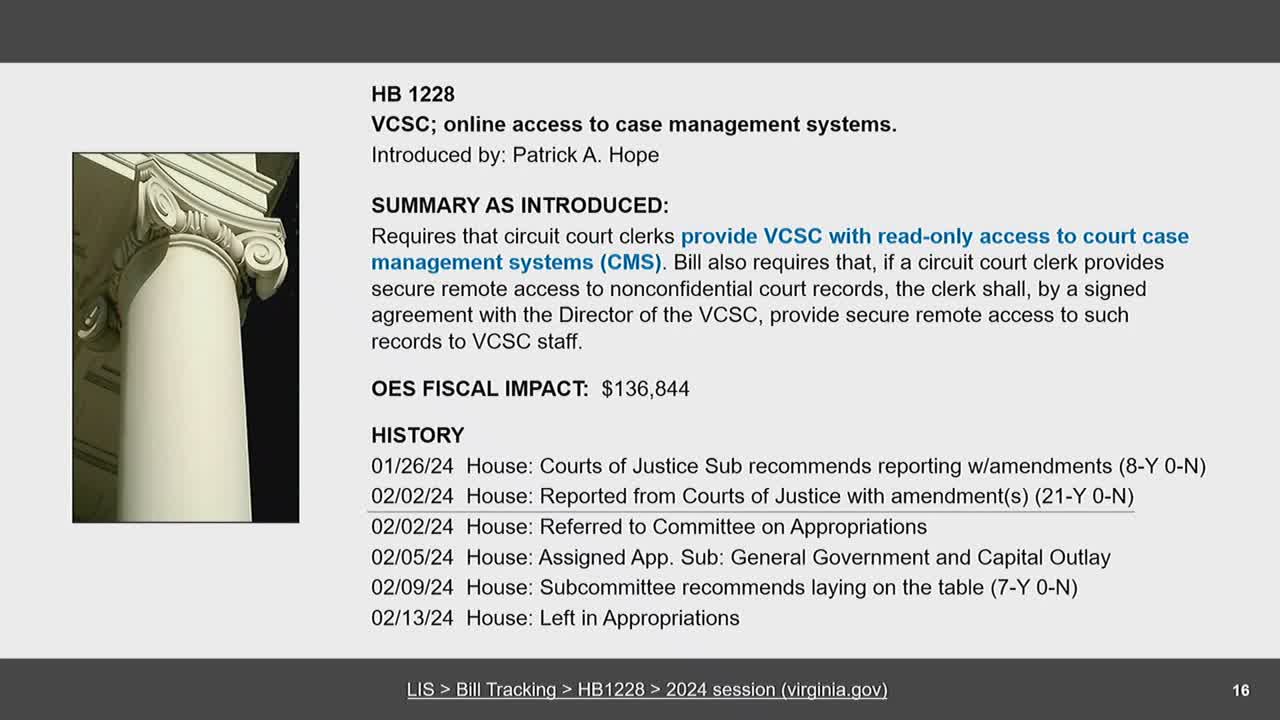Virginia Commission debates juvenile data access and new robbery sentencing guidelines
March 25, 2024 | Criminal Sentencing Commission, Virginia, Boards and Commissions, Executive, Virginia

This article was created by AI summarizing key points discussed. AI makes mistakes, so for full details and context, please refer to the video of the full meeting. Please report any errors so we can fix them. Report an error »

On March 25, 2024, the Criminal Sentencing Commission convened at the Supreme Court building in Virginia to discuss several legislative updates and their implications for the state's criminal justice system. The meeting highlighted ongoing challenges related to data access, juvenile case information, and proposed changes to sentencing guidelines.
A significant topic of discussion was the access to the Case Management System (CMS) for clerks. The Commission aimed to streamline the process by proposing a single form per clerk to manage access for staff members. However, the initial legislation did not expand access but rather sought to restore previous capabilities. Concerns from clerks about the administrative burden of requiring annual forms for each staff member led to amendments in the bill. Ultimately, a compromise was reached to request more frequent data downloads from the CMS, shifting from biannual to monthly updates. This change aims to improve the timeliness of data available for analysis, although it remains a temporary solution pending further legislative action.
Another critical issue addressed was the Commission's lack of access to juvenile defendant information. Currently, the Commission can only access data related to adult defendants, which hampers its ability to provide accurate fiscal impact statements on legislation affecting juveniles. However, proposed language in the Appropriation Act could allow for limited access to juvenile case information for research and evaluation purposes, provided confidentiality is maintained. This would mark a significant step forward in the Commission's ability to analyze juvenile justice trends.
The meeting also covered several bills impacting sentencing guidelines. House Bill 653 proposed changes to the classification of violent felony offenses, while House Bill 77 focused on robbery offenses, including eligibility for conditional release and enhanced sentence credits for lesser degrees of robbery. Notably, House Bill 77 has been vetoed by the governor, and the General Assembly will reconvene on April 17 to address this and other vetoes.
Additionally, House Bill 803 aimed to modify expungement provisions for juvenile records, allowing for the destruction of certain records once the individual reaches 29 years of age. This change could significantly affect how juvenile offenses are scored under sentencing guidelines.
Overall, the meeting underscored the Commission's ongoing efforts to adapt to legislative changes while addressing the complexities of data access and juvenile justice. As the Commission prepares for the upcoming reconvene session, the outcomes of these discussions will be crucial in shaping Virginia's criminal justice landscape.
A significant topic of discussion was the access to the Case Management System (CMS) for clerks. The Commission aimed to streamline the process by proposing a single form per clerk to manage access for staff members. However, the initial legislation did not expand access but rather sought to restore previous capabilities. Concerns from clerks about the administrative burden of requiring annual forms for each staff member led to amendments in the bill. Ultimately, a compromise was reached to request more frequent data downloads from the CMS, shifting from biannual to monthly updates. This change aims to improve the timeliness of data available for analysis, although it remains a temporary solution pending further legislative action.
Another critical issue addressed was the Commission's lack of access to juvenile defendant information. Currently, the Commission can only access data related to adult defendants, which hampers its ability to provide accurate fiscal impact statements on legislation affecting juveniles. However, proposed language in the Appropriation Act could allow for limited access to juvenile case information for research and evaluation purposes, provided confidentiality is maintained. This would mark a significant step forward in the Commission's ability to analyze juvenile justice trends.
The meeting also covered several bills impacting sentencing guidelines. House Bill 653 proposed changes to the classification of violent felony offenses, while House Bill 77 focused on robbery offenses, including eligibility for conditional release and enhanced sentence credits for lesser degrees of robbery. Notably, House Bill 77 has been vetoed by the governor, and the General Assembly will reconvene on April 17 to address this and other vetoes.
Additionally, House Bill 803 aimed to modify expungement provisions for juvenile records, allowing for the destruction of certain records once the individual reaches 29 years of age. This change could significantly affect how juvenile offenses are scored under sentencing guidelines.
Overall, the meeting underscored the Commission's ongoing efforts to adapt to legislative changes while addressing the complexities of data access and juvenile justice. As the Commission prepares for the upcoming reconvene session, the outcomes of these discussions will be crucial in shaping Virginia's criminal justice landscape.
View full meeting
This article is based on a recent meeting—watch the full video and explore the complete transcript for deeper insights into the discussion.
View full meeting
